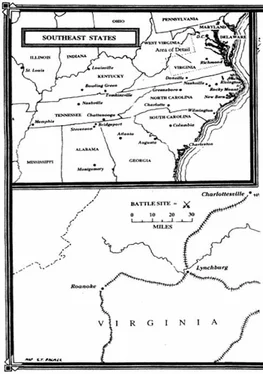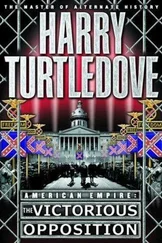Harry Turtledove - The Guns of the South
Здесь есть возможность читать онлайн «Harry Turtledove - The Guns of the South» весь текст электронной книги совершенно бесплатно (целиком полную версию без сокращений). В некоторых случаях можно слушать аудио, скачать через торрент в формате fb2 и присутствует краткое содержание. Год выпуска: 1992, ISBN: 1992, Издательство: Ballantine, Жанр: Альтернативная история, на английском языке. Описание произведения, (предисловие) а так же отзывы посетителей доступны на портале библиотеки ЛибКат.
- Название:The Guns of the South
- Автор:
- Издательство:Ballantine
- Жанр:
- Год:1992
- ISBN:0-345-38468-7
- Рейтинг книги:4 / 5. Голосов: 1
-
Избранное:Добавить в избранное
- Отзывы:
-
Ваша оценка:
- 80
- 1
- 2
- 3
- 4
- 5
The Guns of the South: краткое содержание, описание и аннотация
Предлагаем к чтению аннотацию, описание, краткое содержание или предисловие (зависит от того, что написал сам автор книги «The Guns of the South»). Если вы не нашли необходимую информацию о книге — напишите в комментариях, мы постараемся отыскать её.
The Guns of the South — читать онлайн бесплатно полную книгу (весь текст) целиком
Ниже представлен текст книги, разбитый по страницам. Система сохранения места последней прочитанной страницы, позволяет с удобством читать онлайн бесплатно книгу «The Guns of the South», без необходимости каждый раз заново искать на чём Вы остановились. Поставьте закладку, и сможете в любой момент перейти на страницу, на которой закончили чтение.
Интервал:
Закладка:
He hurried to her. “I’m sure of it.” He had no idea whether they would live happily ever after. He’d start worrying about that tomorrow. Tonight, he did not care.
Robert E. Lee angrily jerked his head to one side, as if he were snapping at his own ear. “Twenty-four men,” he growled. “Twenty-four men holding our country’s future in their pocket—and they will not let it out.”
“Our Senate, like that of the United States upon which it was modeled, is leisurely in debate,” Charles Marshall said.
“Leisurely?” Lee rolled his eyes up toward the ceiling of his office, and toward the heavens that ceiling hid. “Mr. Marshall, I have been raised from childhood with the firm conviction that the republican form of government is the finest ever devised, but the dilatory tactics I have seen in connection with this bill tempt me to doubt my faith therein. Had the Army of Northern Virginia campaigned in the manner in which the Senate debates, AK-47s would not have sufficed to gain our independence.”
“Had the Army of Northern Virginia campaigned in the manner in which the Senate debates, it would have been McClellan’s Army of the Potomac instead,” Marshall said.
Caught by surprise, Lee let out a short bark of laughter. “I will not say you are wrong, sir, but that is no way for a proper army—or a proper government—to conduct its business.”
“The vote must surely come in the next few days, Mr. President,” Marshall said.
“Must it? So people have been claiming for weeks now, yet still the debate goes on, and on, and on.” Lee’s open hand came down with a thump on a pile of the day’s Richmond newspapers. “And still this—this twaddle continues to be printed.”
Charles Marshall raised a sympathetic eyebrow. “It is pretty dreadful, isn’t it?”
“Dreadful? I wish I were a fine profane swearer like General Forrest, so I might more appropriately express my feelings.”
Lee whacked the pile of papers again. Every sort of argument the South had devised over the years to justify slavery was coming out anew in the course of the Senate debate—and in the newspapers. Arguments taken from the Politics of Aristotle lay cheek by jowl with those borrowed from the Book of Genesis and its condemnation of the children of Ham. Tucked in alongside both were modern, allegedly scientific claims that aligned blacks with the great apes and purported to prove them inferior to whites.
In the papers, the counterarguments adduced by supporters of Lee’s legislation seemed feeble by comparison. Those senators had to be circumspect, to keep from sounding like homegrown abolition fanatics. Much of their public argument was based on the evidence of the past few years, evidence that showed the Negro in a light different from that in which he had been viewed before. Could helpless Sambo, they said, have made first a soldier and then a rebel so dangerous that de facto emancipation already existed over broad areas of the Confederacy? The answer, they maintained, was obviously no.
But their foes turned that answer against them. If the Negro could make a soldier and a dangerous rebel, why, then, all the better reason to grant him no concessions; indeed, to tighten control on him harder than ever.
The real trouble was, half the arguments in favor of Lee’s bill could not be stated publicly. Its backers could rail at the Rivington men, could point out how they had murdered to try to force the Southern government away from any step toward emancipation and had revolted when the murders failed to achieve their purpose. That was fine, as far as it went.
It did not go far enough, though. Lee did not want the lesson of future history paraded through the newspapers for Northerners and Englishmen to read. Those secrets were an ace in the hole against the ambitions of nations larger and more powerful than the Confederate States.
If they did not stay secret…Late reports from the war in the Canadas said that some U.S. forces were beginning to carry repeating rifles patterned after the AK-47. That worried Lee. One day before too long, the United States might try a war of revenge against the Confederacy. If they did, he wanted things like buried torpedoes and endless repeaters to stay dark and quiet, the better to surprise the invaders. Trumpeting the knowledge from out of time would only make that harder. In public, then, his supporters had to watch what they said.
He sighed. “When the Second American Revolution began, our bold Southern men said they could beat the North with one hand tied behind their backs. We found out it was not so soon enough. Now I wonder if we can pass this bill while using only one hand.” He explained what he meant to Charles Marshall.
His aide thoughtfully pursed his lips. “If the only way to rally popular support for the legislation would be to allow everything to come out, are you willing to do that?”
“Now there’s a pretty problem!” Lee exclaimed. “I confess I had not thought of it in quite those terms. Which weighs for more, a nation’s safety or justice for its inhabitants?” He considered the question for three or four minutes before continuing, “I believe, sir, the answer must be no. Once a secret is gone, it is gone forever and cannot be restored. But even if my bill fails of passage in this session of Congress, it may be introduced again in future sessions, and one day will surely be approved. How say you?”
“Mr. President, your views generally strike me as sensible, and this instance is no exception. You remind me that you are fighting a war here, not merely a single battle.”
“Well put,” Lee said. “When caught up in the excitement of a single battle, it is important to bear in mind the campaign of which it forms a part.”
“True enough, sir,” Marshall said, “although I had not envisioned your Presidential term as analogous to a military campaign.” He ventured a chuckle. “I suppose that if I spoke with Jefferson Davis, he would say he had spent a good part of his time in office campaigning against our Congress.”
“I do hope to avoid some of the difficulties he had. He was and is a most able man, but also one who sees disagreement as an affront, if not a betrayal. I do not think he himself would disagree with my assessment. I still have hope, at least, that a more conciliatory approach will yield better results.”
“And if not?” Marshall asked.
“If not, I shall bellow and froth at the reprobates until steam starts from my ears as if from a locomotive engine’s safety valve.” Lee caught his aide staring. “I see you do not believe me. Too bad—if I cannot fool you, how am I to deceive the Congress?”
Still shaking his head, Charles Marshall walked out of the office. Lee settled in to his daily paperwork. He had never cared for it, and the Presidency brought far more of it his way than he’d had to deal with even as general. But regardless of whether he cared for it, it was part of his duty, and so he conscientiously undertook it.
A report from the Virginia Military Institute caught his eye. Hendrik Nieuwoudt, one of the Rivington men ordered there, had been found hanged in his room, apparently a suicide. He’d left a note on his bed: “I can’t stand being watched anymore.”
Lee’s mouth tightened. Constant surveillance was the price those AWB men who had been released paid, and would continue to pay, for being suffered to live. That phrase, with its Biblical overtones, echoed in his mind. He’d thought of the Rivington men as captive genies before. Witches, though, made as good a description for them: they had curious powers and they were dangerous. Benny Lang and most of the others appeared to understand and accept that. But Nieuwoudt was the second of their number to kill himself.
Читать дальшеИнтервал:
Закладка:
Похожие книги на «The Guns of the South»
Представляем Вашему вниманию похожие книги на «The Guns of the South» списком для выбора. Мы отобрали схожую по названию и смыслу литературу в надежде предоставить читателям больше вариантов отыскать новые, интересные, ещё непрочитанные произведения.
Обсуждение, отзывы о книге «The Guns of the South» и просто собственные мнения читателей. Оставьте ваши комментарии, напишите, что Вы думаете о произведении, его смысле или главных героях. Укажите что конкретно понравилось, а что нет, и почему Вы так считаете.












